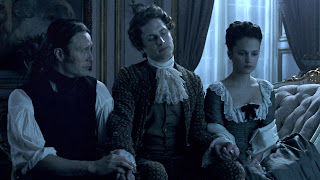DVD Review - A Royal Affair
 |
| Mads Mikkelsen (left), Mikkel Boe Følsgaard and Alicia Vikander (right) in "A Royal Affair" |
A Royal Affair is in the same vein as other historical biopics about the love and political lives of monarchs like Marie Antoinette (2006), The Duchess (2008) and The Young Victoria (2009). The movie is framed as them in that the message is how tough it is for a woman and how put upon a woman is in those time periods. It's patriarchal nonsense, but, despite its framing, this film is not the typical, woe-is-me, because-I'm-a-woman-living-in-the-past story.
Yes, the title suggests that things revolve around a sexual affair, but the affair is less of a thrust as I assumed. The affair is important, but it's probably the least interesting part of this film. Not in a sexist way, as to say that the filmmaker felt that her part possessed less value, but the film does pivot more toward the two leading men. The reference is made to the King Arthur, Lancelot and Guinevere love triangle, which is definitely analogous, but the screenplay by Rasmus Heisterberg and Nikolaj Arcel who both co-write The Girl with the Dragon Tattoo (2009) focuses less on whom wants to be in bed with whom and more on the bromance between the two men.
Mikkel Boe Følsgaard stars as King Christian VII, a young monarch who many accuse of being crazy, of literally having mental problems. He's far from that, as portrayed here, which might conflict with Danish historians. Christian is more or less a spoiled brat who lacks certain boundaries and is guilty of being a horny pig.
Mads Mikkelsen stars as Johann Struensee, the real-life doctor who came to court and was hired to be Christian's personal physician. Struensee is told that Christian suffers from excessive masturbation, but that's not enough to turn the small-town doctor away. Christian is resistant, but Struensee impresses the young king with quotes from Shakespeare.
At first, Struensee is stoic and reserved. It doesn't take long for him to be swept up in Christian's playfulness. They even go to a whorehouse together. Yet, there is more to the man. He's the son of a priest but Struensee is arguably an atheist. He accepts reason over faith in God. Instead of the Bible, he'd rather read Rousseau. Struensee is what is known as a Man of Enlightenment.
Christian is not a Man of Enlightenment, but he is amenable. Christian's love of Shakespeare is evidence of that. It comes from the boyish king's fondness of acting and the theater. Christian adores performing whether it's on a stage or in court. He'll stand up and sing at a moment's notice. Some could describe him as flamboyant.
Putting aside his visits to whorehouses, his flamboyancy and the way that he quickly becomes smitten and almost dependent on his doctor as more could be interpreted as Christian being in love with Struensee. I will go as far as saying that Christian does fall in love with his doctor. In a powerful scene where Christian questions Struensee's loyalty and affection and even accuses another man named Brandt of giving Struensee fellatio, one could almost interpret Følsgaard's performance as jealousy.
Følsgaard won the Silver Berlin Bear at the Berlin International Film Festival. He also won Best Actor at the Bodil Awards and oddly he won Best Supporting Actor at the Robert Awards. All of which were more than deserved. I dare say his performance was better than Mikkelsen's. It's the showier performance, whereas what Mikkelsen is doing is more understated and subtle.
Mikkelsen's character does get some great moments, moments that go to the core issue underlying this film. Denmark, as a part of the European Age of Enlightenment was championed by men like Struensee. He got a lot of push back from those who wanted to maintain control through religion and serfdom. It's ironic and tragic to see Struensee become perhaps as power-hungry as those he fought, people who banned books.
Even knowing the outcome didn't prevent me from being engaged and emotional upon seeing the final twenty minutes of this film. Mostly, it's a testament to the performances, which are superb. Director Nikolaj Arcel builds to a perfect final shot, which even in my most favorite films of the past year didn't have as perfect a final shot. It's a simple wide, one-shot where a simple act of a child opening a curtain letting light inside is stunningly symbolic and amazingly encapsilates the message of the movie.
Five Stars out of Five.
Rated R for sexual content and some violent images.
Running Time: 2 hrs. and 17 mins.










Comments
Post a Comment